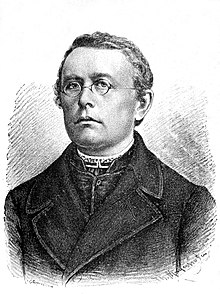music.wikisort.org - Composer
Mykhailo Mykhailovych Verbytsky (Ukrainian: Михайло Михайлович Вербицький; March 4, 1815 – December 7, 1870) was a Ukrainian Greek Catholic priest and composer. He is considered to be one of the first professional Ukrainian composers of Halychyna.[1] Verbytsky is known for composing an alternate melody to the anthem Ще не вмерла Україна (Shche ne vmerla Ukraina), which later became the national anthem of Ukraine. His first name is sometimes translated to the English version of Michael, Polish Michal, Russian and other languages (see Michael for more).

Biography
Mykhailo Verbytsky was born in Nadsiannia. Sources often differ as to the exact location of his birth, with some claiming he was born in Jawornik Ruski[1] and christened 8 km away in Ulucz[2] (the site of the oldest wooden church in Poland where his father was the local priest. Both are now in Subcarpathian Voivodeship, Poland.)
Verbytsky as born into the family of a priest. He was left an orphan at the age of ten, and was raised from then on by his father's brother, Bishop Ivan Snihurskiy. Snihurskiy took Mykhailo to live with him in Peremysl, where his uncle was very active: founding the city's first Ukrainian language printing press, published compilations of folklore and textbooks about the Ukrainian language. In 1818, Snihurskiy even founded a dyak-teaching institute in the city, and ten years later, a cathedral choir and music school.[1] Verbystky was therefore placed in a very active and creative environment.
In 1833, Verbytsky entered the Theological Seminary in Lviv. Here he became seriously engaged in music, learning to play the guitar, which became his favourite musical instrument. He eventually wrote a textbook teaching how to play the guitar and wrote pieces for the instrument. Because of financial problems, he twice had to leave the Seminary, but he eventually graduated and became a priest.[2]


In 1852 Verbytsky received a parish in the village of Mlyny, Yavorskiy county, where he would live and work for the rest of his life. As a priest he wrote many liturgical compositions, which are still sung throughout the Halychyna region. Some of these include Єдинородний Сине (Only Beggoten Son), Святий Боже (Holy God), Алилуя (Alleluia), Отче наш (Our Father), and Хваліте Господа з небес (Praise the Lord from the heavens).[2]
Music
As a composer he helped lay the foundations for the development of modern Ukrainian music. His works are formally unsophisticated, often strophic, and usually in the minor mode; but his stage works (notably Prostachka (‘The Simpleton’), 1870) are representative of a popular folk genre that was melodically fluid, singable, pictorial and emotionally evocative. His instrumental writing does not extend far beyond the simple development of folktunes. Nevertheless, he composed 12 symphonies (overtures), on the sixth of which Stanislav Lyudkevich based an orchestral piece and a piano trio. He also composed Zapovit (‘Testament’, 1868), a setting of Shevchenko’s poem for bass solo, double choir and orchestra, the operetta Podgoryane which was staged in Lemberg (now L′viv, 1864), and numerous sacred and secular choral works and songs. He is best known as the composer of the Ukrainian national anthem by the words of Pavel Chubinsky Shche ne vmerla Ukrayiny (‘Ukraine has not Perished’), which in 1917 was adopted by the new Ukrainian republican government.
Compositions
Musicologist Uliana Petrus' has put together a list of 133 known compositions by M. Verbytsky. These include:
- Large scale secular choral works - 30
- Sacred choral works - 37
- Vocal ensembles
- Art songs -10
- Arrangements of folk songs - 10
- Orchestral works - 18 works including 9 symphonies
- Chamber works
- 15 works for various instruments
- Music to 12 stage works
Commemoration
In 2005 the chapel-pantheon over the tomb of Mykhailo Verbytsky was opened to mark the 140th anniversary of Ukrainian national anthem and 190th anniversary of its composer.
References
- Як «зустрілися» наддніпрянець і галичанин (How an over-Dnipro resident and a Halychian "met") website of the Den' newspaper (in Ukrainian)
- Михайло Вербицький Етнографія (Mykhailo Verbytsky Ethnography) Archived 2007-01-01 at the Wayback Machine lemky.com (in Ukrainian)
Sources
- Andriy V. Szul. The New Grove Dictionary of Opera, edited by Stanley Sadie (1992). ISBN 0-333-73432-7 and ISBN 1-56159-228-5
- Загайкевич, Марія Михайло Вербицький - Сторінки життя і творчості - Львів, 1998 ISBN 966-02-0819-7
External links
 Media related to Mykhailo Verbytskyi at Wikimedia Commons
Media related to Mykhailo Verbytskyi at Wikimedia Commons
На других языках
[de] Mychajlo Werbyzkyj
Mychajlo Mychajlowytsch Werbyzkyj (ukrainisch Михайло Михайлович Вербицький; * 4. März 1815 in Jawornik Ruski, Galizien, Kaisertum Österreich; † 7. Dezember 1870 in Młyny, Königreich Galizien und Lodomerien, Österreich-Ungarn) war ein ukrainischer griechisch-katholischer Priester und Komponist.- [en] Mykhailo Verbytsky
[es] Mijailo Verbitski
Mijailo Verbitski (en ucraniano, Михайло Михайлович Вербицький) (4 de marzo de 1815 - 7 de diciembre de 1870) fue un compositor ucraniano, y un sacerdote greco-católico.[1] Es famoso por haber compuesto una melodía alternativa a la canción Sche ne vmerla Ukraina (Ucrania no ha perecido) la cual se convirtió en el Himno Nacional de Ucrania.[ru] Вербицкий, Михаил Михайлович
Михаил Михайлович Вербицкий (укр. Михайло Михайлович Вербицький); (4 марта 1815 — 7 декабря 1870) — украинский композитор, общественный деятель, священник, автор музыки гимна Украины «Ще не вмерла Україна…».Другой контент может иметь иную лицензию. Перед использованием материалов сайта WikiSort.org внимательно изучите правила лицензирования конкретных элементов наполнения сайта.
WikiSort.org - проект по пересортировке и дополнению контента Википедии